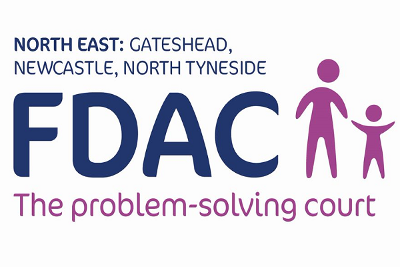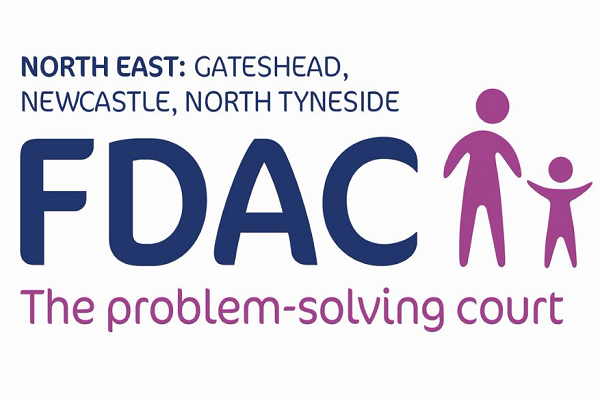Family Drug and Alcohol Court to help families

The first Family Drug and Alcohol Court (FDAC) in the north east has been launched to try to reduce the number of children taken into long-term care.
In partnership with Newcastle City Council, North Tyneside Council and the judiciary, we have adopted this multi agency approach to support families impacted by drug and alcohol abuse. The court, which is for parents whose children are subject to proceedings due to their drug and alcohol problems, will operate as part of an initial two-year pilot
The court offers an alternative to ordinary care proceedings, with the local authorities reviewing all cases they are taking to family court to see which are suitable for FDAC. A case will be suitable if parental drug and alcohol use is the council's main worry or because parents are showing real signs that they want to make changes.
Families involved with the court will not only get support from a wide range of professionals but will see the same judge every two weeks to encourage them to focus on tackling their substance misuse and keeping their family together.
Councillor Gary Haley, Cabinet Member for Children and Young People, said "We want to give our families the best chance of staying together and we feel that this approach will help give them the support they need to do this. This is an innovative way of working and research shows that not only families are more likely to stay together but parents are more likely to address the issues they are facing.
"This model puts our families at the heart of the process. By bringing services together we know we can make a real difference and help our families to achieve the best possible outcomes."
Councillor Paula Holland, Newcastle City Council, Cabinet Member for Education and Skills, said "We're really pleased that we've been able to work with neighbouring authorities, the judiciary and partner agencies to establish the FDAC and look forward to seeing the benefits it can bring to families in Newcastle, Gateshead and North Tyneside.
"We know from elsewhere that FDACs are more successful than conventional care proceedings in keeping children safely with their parents and allowing parents to overcome problems such as drugs and alcohol misuse and we look forward to seeing improved prospects for those families involved."
Councillor Peter Earley, Cabinet Member for Children, Young People and Learning, at North Tyneside Council added: "We are pleased to be working with Newcastle and Gateshead councils and the judiciary on this pilot. Our priority is working together with the families to enable the best possible outcome for each child.
"The impact of drug and alcohol dependency can be long-lasting and have a harmful effect on families, but this pilot offers parents wide-ranging tailored support to help them to overcome these problems and hopefully in turn keep families together."
FDACs were first launched in 2008. Research from other areas has shown that this approach achieves significantly better outcomes than normal proceedings with more children remaining with or returning to their parents at the end of proceedings and more parents overcoming their problems.

The first Family Drug and Alcohol Court (FDAC) in the north east has been launched to try to reduce the number of children taken into long-term care.
In partnership with Newcastle City Council, North Tyneside Council and the judiciary, we have adopted this multi agency approach to support families impacted by drug and alcohol abuse. The court, which is for parents whose children are subject to proceedings due to their drug and alcohol problems, will operate as part of an initial two-year pilot
The court offers an alternative to ordinary care proceedings, with the local authorities reviewing all cases they are taking to family court to see which are suitable for FDAC. A case will be suitable if parental drug and alcohol use is the council's main worry or because parents are showing real signs that they want to make changes.
Families involved with the court will not only get support from a wide range of professionals but will see the same judge every two weeks to encourage them to focus on tackling their substance misuse and keeping their family together.
Councillor Gary Haley, Cabinet Member for Children and Young People, said "We want to give our families the best chance of staying together and we feel that this approach will help give them the support they need to do this. This is an innovative way of working and research shows that not only families are more likely to stay together but parents are more likely to address the issues they are facing.
"This model puts our families at the heart of the process. By bringing services together we know we can make a real difference and help our families to achieve the best possible outcomes."
Councillor Paula Holland, Newcastle City Council, Cabinet Member for Education and Skills, said "We're really pleased that we've been able to work with neighbouring authorities, the judiciary and partner agencies to establish the FDAC and look forward to seeing the benefits it can bring to families in Newcastle, Gateshead and North Tyneside.
"We know from elsewhere that FDACs are more successful than conventional care proceedings in keeping children safely with their parents and allowing parents to overcome problems such as drugs and alcohol misuse and we look forward to seeing improved prospects for those families involved."
Councillor Peter Earley, Cabinet Member for Children, Young People and Learning, at North Tyneside Council added: "We are pleased to be working with Newcastle and Gateshead councils and the judiciary on this pilot. Our priority is working together with the families to enable the best possible outcome for each child.
"The impact of drug and alcohol dependency can be long-lasting and have a harmful effect on families, but this pilot offers parents wide-ranging tailored support to help them to overcome these problems and hopefully in turn keep families together."
FDACs were first launched in 2008. Research from other areas has shown that this approach achieves significantly better outcomes than normal proceedings with more children remaining with or returning to their parents at the end of proceedings and more parents overcoming their problems.
